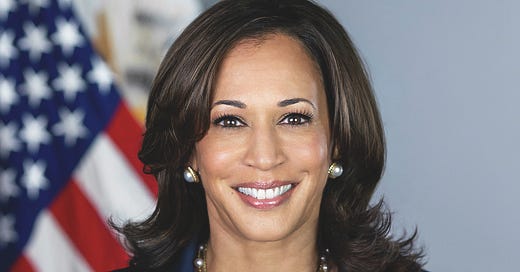There has been lots written, by me and others, about what a second Trump Presidency could mean for global trade. This is mainly because trade wars create good content for newsletter writers are bad.
Less has been written about a Harris Presidency might mean.
This is mainly because, other than labelling Trump’s universal tariff on imports into the US “Trump’s sales tax”, her campaign really hasn’t said much about trade.
But it is interesting — to me at least — that some of the vocal Democrat supporters of Biden’s trade policies, and USTR Katherine Tai in particular, are seemingly starting to worry that change is in the air.
See, for example, Politico’s report on Cathy Feingold (director of the AFL-CIO’s international department)’s comments from earlier this week:
“We really think that Ambassador Tai’s leadership has been critical”
We would support her continued leadership, as well as expanding the staffing she has and the resources and the appropriations that are needed to really implement this vision.”
The Roosevelt Institute’s Todd N. Tucker, who is a pretty accurate bellweather of sentiment and trade ideas circulating in the Tai/organised labour wing of the party has published a new paper: “The New US Trade Agenda - Institutionalizing Middle-Out Economics in Foreign Commercial Policy”.
The paper’s expressed aim is to take stock of the changes to US trade policy over the past four years. In particular, it emphasises the break from the so-called “neoliberal” trade policies of the past, and frames intiatives such as the inflation reduction act, an uptick in labour and environment-related trade disputes with Mexico as evidence of a sucesful recalibration.
In reality, to the untrained, yet slightly cynical eye, it reads as a defence of, and job [re]application for, USTR Katherine Tai.
See, for example, this recommendation:
Retaining current leadership and filling vacancies with like-minded deputies. As noted in this report, Ambassador Tai has been uniquely effective at helping align trade policy with middle-out economics and would be a valuable asset to future administrations. Additionally, there are currently two vacancies for Deputy USTR that should be filled with compatible experts. The current vacancy for chief intellectual property negotiator should be filled with someone sympathetic to aligning this policy area with the flexibilities necessary to fight future pandemics and the climate crisis.
I’m not at all qualified to comment on the internal politics of the US, but I do have some thoughts on one of the more introspective sections of the report: the reaction of allies and their general unwillingess to cooperate.
Or to phrase it differently: why are US allies so sceptical about all of this?
Keep reading with a 7-day free trial
Subscribe to Most Favoured Nation to keep reading this post and get 7 days of free access to the full post archives.




